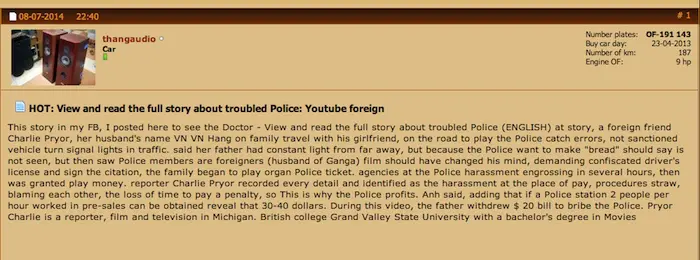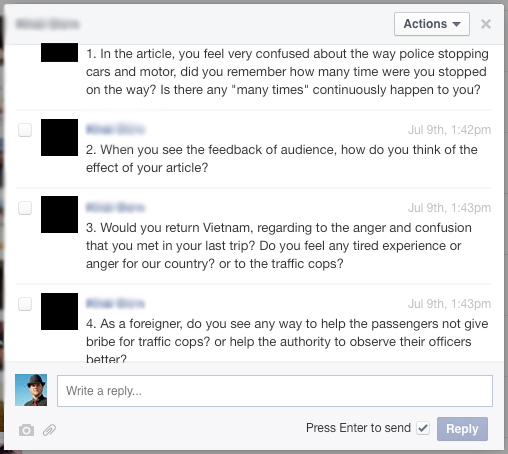Translation Problems: Answering Questions From Vietnamese
my article about Vietnam Traffic Police, the mistakes vary widely. With that, I’d like to take a moment to address some of the key mistakes Vietnamese media might be making, and try to clear up any problems with translation along the way. I understand that, in terms of major newspapers, the writers within Vietnam are obligated, dare I say ‘forced’ perhaps, to show their country in as positive of light as possible. With that in mind, I’d like to present the 5 biggest translation problems of my article so far, and the interpretation issues of the story as seen by those who are not native English speakers:
Translating the English I write is almost impossible
[caption id="attachment_4533" align="aligncenter" width="700"] A forum post in Vietnamese, translated to English by Google[/caption]
Translating my writing into almost any other language is going to be difficult. This is mostly because I type like I speak, and that includes the sarcasm and adventurous wordplay that goes into expressing a thought or idea. With regards to Vietnam, my sarcasm and colorful speech isn’t something that can be easily caught by those who don’t speak English natively. In fact, many regular English speakers aren’t going to fully understand what I say if they haven’t grown up within the American culture where I’ve lived my entire life. It isn’t because you’re dumb or anything – but because I use words they don’t teach you in classes. I say phrases and sentences that you simply have to be here to understand. It’s no different for me learning Vietnamese: there are going to be things you say that I simply will not understand fully, because I didn’t grow up there.
Using Google Translate is a terrible way to read stories by other countries. It just doesn’t work as well as we’d like it to. Hopefully, many of the official sources of news out there have native English speakers, but those who don’t have gotten a lot wrong. So… every other point I’m going to make below stems from that fundamental language translation problem.
A forum post in Vietnamese, translated to English by Google[/caption]
Translating my writing into almost any other language is going to be difficult. This is mostly because I type like I speak, and that includes the sarcasm and adventurous wordplay that goes into expressing a thought or idea. With regards to Vietnam, my sarcasm and colorful speech isn’t something that can be easily caught by those who don’t speak English natively. In fact, many regular English speakers aren’t going to fully understand what I say if they haven’t grown up within the American culture where I’ve lived my entire life. It isn’t because you’re dumb or anything – but because I use words they don’t teach you in classes. I say phrases and sentences that you simply have to be here to understand. It’s no different for me learning Vietnamese: there are going to be things you say that I simply will not understand fully, because I didn’t grow up there.
Using Google Translate is a terrible way to read stories by other countries. It just doesn’t work as well as we’d like it to. Hopefully, many of the official sources of news out there have native English speakers, but those who don’t have gotten a lot wrong. So… every other point I’m going to make below stems from that fundamental language translation problem.
I’m not anti-Viet Nam. I love Viet Nam
One of the key things to take from this article I wrote back in January of this year, is that I don’t hate Viet Nam. Indeed, I see a variety of things with the country that could be improved upon, but in no way am I insinuating that I have any answers. My country (the United States) is far from perfect. In fact I’ve been quite vocal about downright despising many things we do in this country, such as our obsession with military conflict around the world, our obsession with religious policy infecting government, our passion for locking up our own citizens while further destroying our own economy, and our lack of compassion or regard for anyone making less than a million dollars a year, or anyone who isn’t contributing money to some politicians pockets. My country is likely just a screwed up as yours, except American officials are simply bribed with more money. Some people are angry, most likely as a direct response from not fully understanding what I was saying. People like THIS GUY HERE say all sorts of angry stuff. Sorry you feel that way bro. Everyone has their problems, and my article makes absolutely no attempt to address them all. What I do attempt, however, is to tell a story of experience. To tell people about something I witnessed and experienced multiple times as an injustice against common citizens. An overreach of power with an all but non-existence of oversight. My article is about the traffic police in Viet Nam (CSGT) and that’s all. Nothing more, nothing less. It isn’t a piece against your government, or your people. I don’t know nearly enough about them to write about it. I even see some people thinking I’m racist, or just against Vietnamese because I’m white. To you people I say: Quit being stupid. I married a Vietnamese woman.I’m not ashamed for having to share this, nor am I embarrassed
Some publications have noted that I feel bad about sharing things like this, and that I’m embarrassed for Viet Nam. That is ridiculous. It’s not true. I’m not ashamed, nor am I even sorry for sharing it. If I was, it wouldn’t still be online for the tens of thousands of people to see every day (thanks for visiting my blog, by the way!). I’m passionate about sharing things that matter to me. I’m in no way embarrassed about doing it. The fact is: the story has little to do with me. Really, it has nothing to do with me outside of being the person telling the story, and shooting the video. Probably the only thing about this entire ordeal that I actually regret is not blurring some faces when I published the video. That’s pretty much it. You, as a Vietnamese person, shouldn’t be embarrassed or ashamed either. This isn’t your fault. You are more than likely a victim of this system, not the cause. Don’t feel embarrassed; feel angry about it, and fuel the discussion in your country for change.I’m not confused. I’m fully aware of everything
[caption id="attachment_4542" align="aligncenter" width="508"] Questions asked to me by a reporter from a major Vietnamese newspaper…[/caption]
One question I was asked by a reporter at a popular Vietnamese newspaper (there have been several that have contacted me so far), was that I appeared to be confused about what was going on in the video. They didn’t believe I was fully aware of the situation, and that’s why I interpreted things this way. You think I simply don’t understand why were were stopped.
I understand why you’d want to express that to me… after all, part of your job is to spin things as favorable to your country and government as possible – so naturally you’d believe I don’t understand, and would write accordingly. Allow me, however, to clear this up right now:
I’m fully aware of what’s happening, and have experienced it once before, in the countryside when traveling north towards Da Nang. I tell that story in the article too. In that case, officers were standing in the middle of the road, waving a stick for us to pull over. They claimed we were speeding over 4km back from where they pulled us over, which is obviously impossible to prove. I’ve been in a car that was stopped by traffic police twice in the two months I’ve been to Vietnam, and in both cases, there was really no cause for the stop. Reasons were entirely made up. What amazes me, is that there is no appeals process for traffic violations. The people have no way to fight the ticket, or argue their case. It’s an officers word against theirs, and with that authority, it’s easy to abuse the power against the rights of a citizen.
Questions asked to me by a reporter from a major Vietnamese newspaper…[/caption]
One question I was asked by a reporter at a popular Vietnamese newspaper (there have been several that have contacted me so far), was that I appeared to be confused about what was going on in the video. They didn’t believe I was fully aware of the situation, and that’s why I interpreted things this way. You think I simply don’t understand why were were stopped.
I understand why you’d want to express that to me… after all, part of your job is to spin things as favorable to your country and government as possible – so naturally you’d believe I don’t understand, and would write accordingly. Allow me, however, to clear this up right now:
I’m fully aware of what’s happening, and have experienced it once before, in the countryside when traveling north towards Da Nang. I tell that story in the article too. In that case, officers were standing in the middle of the road, waving a stick for us to pull over. They claimed we were speeding over 4km back from where they pulled us over, which is obviously impossible to prove. I’ve been in a car that was stopped by traffic police twice in the two months I’ve been to Vietnam, and in both cases, there was really no cause for the stop. Reasons were entirely made up. What amazes me, is that there is no appeals process for traffic violations. The people have no way to fight the ticket, or argue their case. It’s an officers word against theirs, and with that authority, it’s easy to abuse the power against the rights of a citizen.


Charlie, its not always about translation. Though English is not my native language I still can understand your writing. People misinterpreted not because of their bad English. Its because they read with a blind patriotism instead of a mind. Its not the first time I’ve seen such over-reaction when a foreigner says something negative about our country. Some people think a true patriot must defend in every possible way when someone talk bad about their country. I call them hypocrites and extremists. Back to your story about traffic police, I don’t find anything offensive yet. Keep on writing as long as what you write about is true. I like your writings
I dont know how about others, as for me I think , the problem is the translation. Same for you. I,as a Vietnamese person, I have been joined a translation class, I really see the problem. When I read a article written by native person, It’s difficult to understand fully if not to say, maybe mistake.
I realise you really love Vietnam, without that, you cant spend your time to write about my country not any else coutry. Of course, I’m so glad.
doanthuongtcdnb It’s very hard to understand exactly what I’m saying when I write, if you don’t natively speak English. There’s stylistic language, sarcasm, and cultural references that fly past people who don’t know English well. It causes a bad interpretation of the language, which is sadly something I have no control over when Vietnamese media publishing things.
Thanks for being understanding on that.